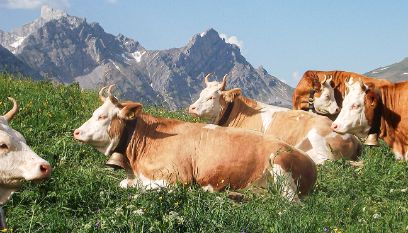Internationally, once-a-day (OAD) milking, which was prohibited in Switzerland until 2020, is an interesting alternative for pasture-based dairy systems in terms of labour economics in that it reduces the workload and burden on people and livestock where there is a shortage of labour or feed or where pastures are located far away.
As a closed system, a bovine dairy processing its own milk from Alpine pasture is ideally suited to an investigation, at manageable effort and expense, of the impacts of OAD along the value chain. For this reason, a trial was conducted on such an Alpine pasture holding in the canton of Grisons. Over four summers from 2015 to 2019, roughly 55 still lactating cows out of an average of 85 summered cows were milked only once instead of twice a day. The impacts on the animals, the dairy products and management in general were analysed with regard to the following parameters:
- Milk yield, milk constituents, somatic cell count
- The cows‘ energy provision, physical condition and weight development
- Milk processing and cheese quality
- Pasture management, animal behaviour
- Labour management
- Cost effectiveness
The change in food legislation introduced as of the summer of 2020, including the lifting of the prohibition of OAD milking, has the potential to reduce the significant pressure on home farms in mountain regions to convert from dairying to suckler cows and thus preserve the high value-added potential of specialty dairy products in these regions. For the Alpine pasture holdings, this in turn means that the environmentally particularly sustainable as well as economically and touristically highly attractive dairy farming enterprises will be preserved.
The project’s key findings were summarised in a fact sheet for owners and graziers of Alpine pasture holdings and their staff.




















